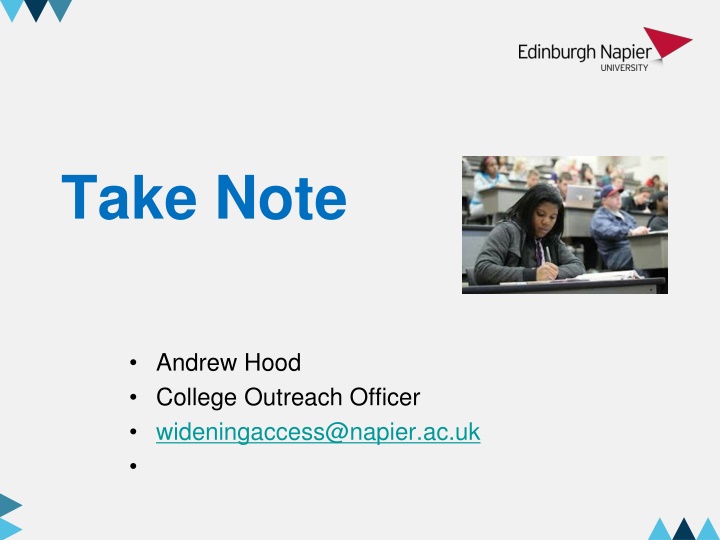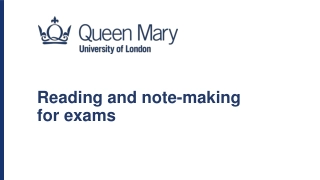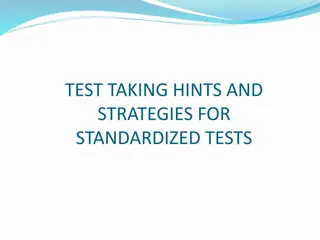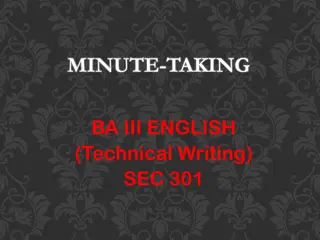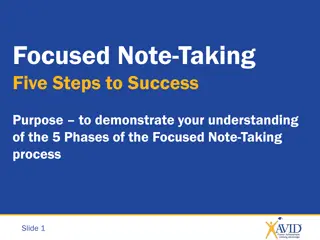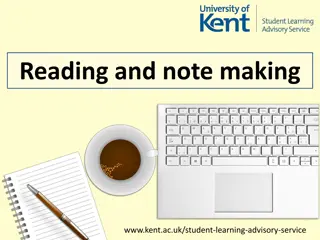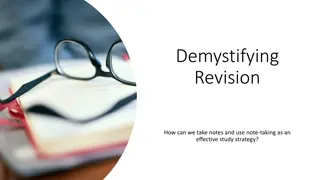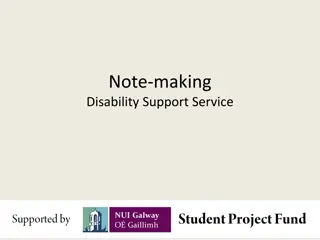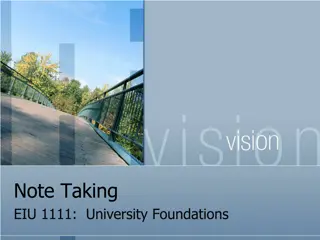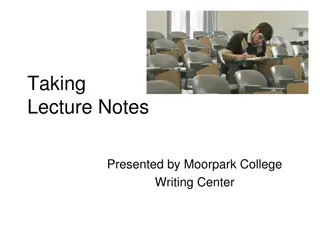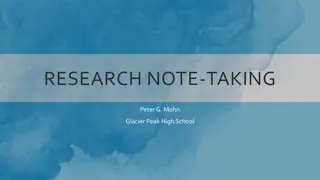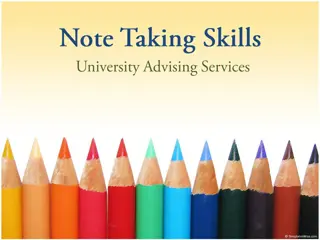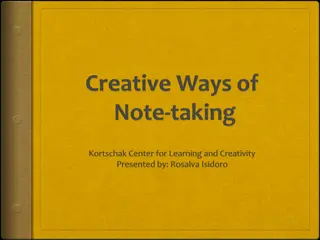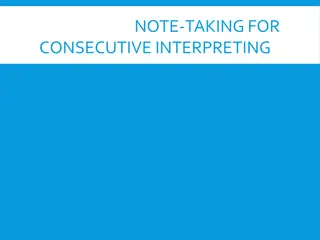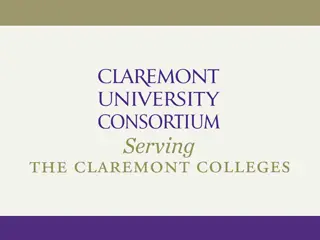Effective Note-Taking Strategies for College Success
Enhance your college learning experience with effective note-taking strategies. Understand the importance of note-making, learn how to prepare for lectures, make notes during classes, and utilize lecturer signposting. Discover why notes are vital for memory retention and exam preparation. Improve your academic performance by implementing these tried-and-tested techniques.
Download Presentation

Please find below an Image/Link to download the presentation.
The content on the website is provided AS IS for your information and personal use only. It may not be sold, licensed, or shared on other websites without obtaining consent from the author.If you encounter any issues during the download, it is possible that the publisher has removed the file from their server.
You are allowed to download the files provided on this website for personal or commercial use, subject to the condition that they are used lawfully. All files are the property of their respective owners.
The content on the website is provided AS IS for your information and personal use only. It may not be sold, licensed, or shared on other websites without obtaining consent from the author.
E N D
Presentation Transcript
Take Note Andrew Hood College Outreach Officer wideningaccess@napier.ac.uk
Active learning at college/university Retaining information An individualised approach
Note making Why make notes? What kind of notes do you need? What should you do in a lecture?
Studying at University What is different at University? Lectures Tutorials/Seminars Independent learning Why do we need to take notes? To help us remember what was covered Not everything is in textbooks To help us revise later
Why make notes? Notes act as memory aid Tony Buzan (1999): Without active learning, we forget 98% of information in just three weeks It actively involves you in the learning process It helps to develop your understanding It allows you to reduce information to a manageable size Notes are helpful when preparing assignments or for exams
The note making process The note taking process works best when Before lecture it is integrated into your learning strategy. Useful lecture notes During lecture After lecture This can take many forms, but must suit you.
Before: Prepare and tune in Prepare: Advance reading Print off and read the lecture outline (slides or notes) If relevant, read your notes from the previous lecture Look up scientific / technical terms and subject- specific jargon. Tune yourself into the topic by thinking of questions.
During: Make notes Annotate handouts Note questions you have Note making improves with practice
Lecturer signposting Framework: Lecturers often say at the beginning of a lecture how they have structured their lecture and what they are going to cover. Don t try to write everything down! Your goal isn t to transcribe your lecturer word for word. kizombaharmony.com
Lecturer signposting Pay attention to cues conscious or subconscious. You need to know this, or This will come up in your Repetition is often used to reinforce key points. Anything said very slowly, so that it can be taken down word for word. If your lecturer starts talking more quickly, loudly or with more emphasis.
Lecturer signposting Look out for for language that shows relationships between ideas first, second, third especially, most significant, most important, however, on the other hand because, so, therefore, consequently a possible explanation of this it might be that to clarify Look out for language that signposts direction - later on I m going to talk about - and now I m going to
Most students adopt their own abbreviations for note taking and & question mark - a good way to remind yourself to ask about something or look this point up later on ? therefore smaller or equal to Adapted from The Open University (2013)
~ approximately increase rapid increase decrease rapid decrease # number cf contrast with/cross reference Adapted from The Open University (2013)
Other ways to capture Process 1 Process 2 Advantages Less expensive More effective Disadvantages Less effective More expensive Characteristics Manual Automatic Evidence Widely used Laboratory testing
Get organised How do you work best? What note-taking style works for you? Laptop? Planned? Mind maps?
Note taking style You might want to: use colour coding, images or diagrams use a numeric model additional methods a combination of the above or whatever works for you Consider what style of note taking works best for you nesslabs.com/from-note-taking-to-note-making The Open University (2013). Effective note taking. Available from: http://www.open.ac.uk/choose/unison/develop/my- skills/effective-note-taking [accessed 03.02.21]
Identify your Learning Style Do you absorb information best by: Listening and then writing the information down Describing what you have just heard to someone Creating diagrams to illustrate key concepts
After a class: add value Review your lecture notes You might want to: Edit and clarify your notes Add further information Question some of what you have Add your own thoughts It's not enough just to re-read notes... you have to use them!
In summary Make notes in your own words Use different methods for different purposes e.g. flowcharts for processes tables for comparison Organise your notes title, date, page numbers and file them combine all your notes from lectures, tutorials, independent study, group work etc. and compile for exam and assessment revision X Don't cram too much in leave room to add in X Don t leave reviewing notes until revision
Apps Google Docs Microsoft OneNote Use your phone!
The Open University (2013). Effective note taking. Available from: http://www.open.ac.uk/choose/unison/develop/my- skills/effective-note-taking [accessed 03.02.21]
